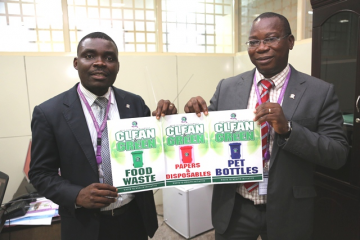Covenant University has flagged off a Waste to Wealth initiative (W2W) as part of her drive to create a sustainable environment and generate revenues from environmental waste, thus reducing the pressure and consumption of virgin materials. The project is expected to cover peculiar aspects of solid waste management in the University, which include refuse generation, source reduction, collection, transportation, recycling and resource recovery, composting and combustion.
The project will entail the appropriate bagging of waste into three basic categories: Paper, PET bottles and leftover foods.
According to the Chairman of the Waste to Wealth initiative, Dr. David Olukanni, the idea is simply about investing effectively in waste management operations towards reducing environmental pollution through sustainable practice in the University community, turning waste to wealth and creating a unique platform for internally generated revenue.
Towards this end, a six-stage step-by-step approach has been mapped out for the smooth take off the initiative. This starts with the collection of waste paper, PET bottle, and nylon waste bailed for sale to would-be buyer, setting up a vibrant waste management centre to recycle paper and nylon waste generated within the campus turning them into useful products such as tissue paper and envelops, and establishing a glass bottle recycling programme involving students, faculty in research and staff. Moreover, the initiative would be strategically extended to the University’s host community to harness all potential wastes of benefit, composting of all organic waste that will serve as manure for Covenant University Farm, and generate biogas from the organic waste.
Part of the objectives of the initiative is to enhance environmental sustainability; provide excellence in waste reduction, recycling services and other sustainable environment friendly practice on campus; and endow students with direct experience in environmental management through environmental stewardship, internship, paid position and volunteer opportunities.
In executing the project efficiently, the University Management is set to educate members of the University community on recycling standards and actions to conserve resources. The Management will also see to the creation of 145 waste collection points around Campus, and tracking the University’s waste stream by identifying, researching and establishing market opportunities for waste material generated on campus.
In addition, the initiative will help in developing waste reduction, reuse prospects for the Covenant University community, and above all, contribute positively to the heralding of the Campus Green Project, which will be a subsidiary initiative of the United Nation’s Green Earth Project.
Currently, there are 37 universities in the world where there are effective waste recycling programme running, with only the top 17 involved in a recycling competition, where the university with the highest ton of recycled waste is declared the winner.
With its entry into the waste recycling terrain, Covenant University has successfully joined the league of top universities in the world who are involved in waste recycling programme and the only African university embarking on such initiative.

